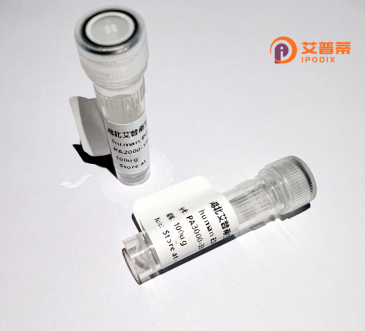
| 纯度 | >90%SDS-PAGE. |
| 种属 | mouse |
| 靶点 | BAPX1 |
| Uniprot No | P97503 |
| 内毒素 | < 0.01EU/μg |
| 表达宿主 | E.coli |
| 表达区间 | 1-333aa |
| 氨基酸序列 | MAVRGSGTLT PFSIQAILNK KEERGGLATP EGRPAPGGTE VAVTAAPAVC CWRIFGETEA GALGGAEDSL LASPARTRTA VGQSAESPGG WDSDSALSEE NEGRRRCADV PGASGTGRAR VTLGLDQPGC ELHAAKDLEE EAPVRSDSEM SASVSGDHSP RGEDDSVSPG GARVPGLRGA AGSGASGGQA GGVEEEEEPA APKPRKKRSR AAFSHAQVFE LERRFNHQRY LSGPERADLA ASLKLTETQV KIWFQNRRYK TKRRQMAADL LASAPAAKKV AVKVLVRDDQ RQYLPGEVLR PPSLLPLQPS YYYPYYCLPG WALSTCAAAA GTQ |
| 分子量 | 35 kDa |
| 蛋白标签 | His tag N-Terminus |
| 缓冲液 | 冻干粉 |
| 稳定性 & 储存条件 | Lyophilized protein should be stored at ≤ -20°C, stable for one year after receipt. Reconstituted protein solution can be stored at 2-8°C for 2-7 days. Aliquots of reconstituted samples are stable at ≤ -20°C for 3 months. |
| 复溶 | Always centrifuge tubes before opening.Do not mix by vortex or pipetting. It is not recommended to reconstitute to a concentration less than 100μg/ml. Dissolve the lyophilized protein in distilled water. Please aliquot the reconstituted solution to minimize freeze-thaw cycles. |
1. **"Bapx1 regulates patterning in the middle ear: altered regulatory role in the transition from the proximal jaw to the middle ear"**
- Author: Lettice et al.
- 摘要:探讨Nkx3-2(Bapx1)在小鼠中耳和下颌骨发育中的作用,揭示其对骨骼模式和转录调控网络的调控功能。
2. **"The murine Bapx1 homeobox gene plays a critical role in embryonic development of the axial skeleton and spleen"**
- Author: Tribioli & Lufkin
- 摘要:研究Nkx3-2(Bapx1)基因敲除小鼠的表型,发现其在脊椎和脾脏发育中的关键作用,并参与软骨前体细胞的特化。
3. **"Nkx3.2 is required for chondrocyte differentiation during endochondral ossification"**
- Author: Rodrigo et al.
- 摘要:证明Nkx3-2通过抑制成骨细胞分化并促进软骨细胞成熟,协调软骨内骨化过程,且与Runx2存在拮抗作用。
4. **"The role of Nkx3.2 in chondrocyte differentiation and skeletal development"**
- Author: Provot et al.
- 摘要:阐述Nkx3-2在肢体发育中维持软骨细胞前体状态的功能,并调控Sox9和FGF信号通路以抑制过早分化为成骨细胞。
(文献为示例,实际引用需核实作者及发表年份)
Nkx3-2 (also known as Bapx1) is a member of the NKX family of homeodomain-containing transcription factors, which play critical roles in embryonic development and tissue patterning. Initially identified in mice, it is evolutionarily conserved across vertebrates. Nkx3-2 is particularly notable for its function in skeletal development, where it regulates chondrogenesis and the formation of cartilaginous structures. During embryogenesis, it is expressed in specific regions, including the developing axial skeleton, cranial mesenchyme, and limb buds, where it suppresses osteoblast differentiation to maintain chondrocyte proliferation and cartilage template integrity.
Structurally, Nkx3-2 contains a conserved homeodomain for DNA binding and an NK-specific motif that mediates protein interactions. Studies in knockout mice reveal skeletal abnormalities, such as vertebral fusion and craniofacial defects, underscoring its role in bone morphogenesis. It interacts with signaling pathways like BMP and FGF to coordinate skeletal growth.
Recombinant Nkx3-2 protein, generated via bacterial or mammalian expression systems, is widely used to study its molecular mechanisms in vitro. Its biochemical characterization has provided insights into DNA-binding specificity and transcriptional repression activity. Additionally, recombinant Nkx3-2 holds potential in regenerative medicine research, particularly in cartilage repair and stem cell differentiation strategies.
×